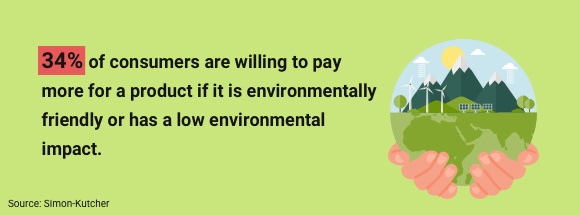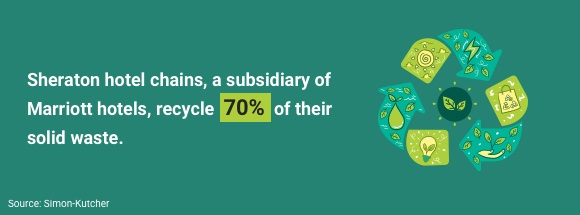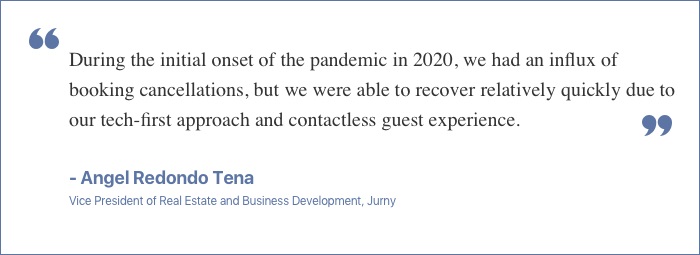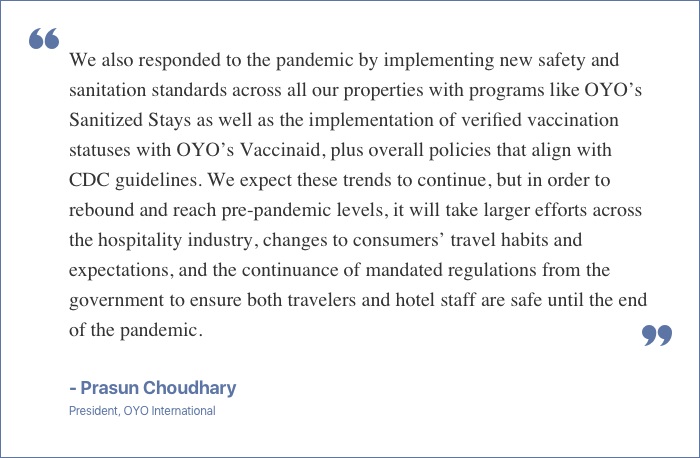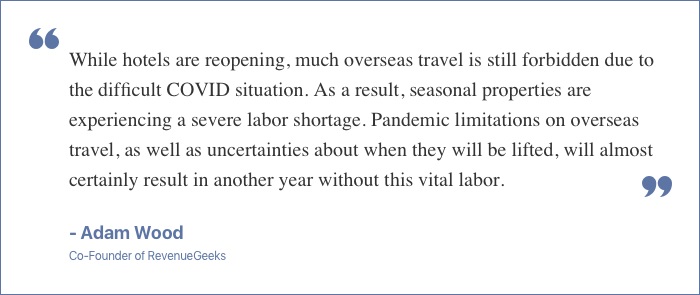Abstract:
The global pause and operational disruption in the hospitality industry stirred by the pandemic have eventually accelerated the rational plea for a more resilient and sustainable future. The hospitality sector is also vouching for creating a balance between sustainability measures and guest experience by adhering to the latest consumer demands. This research titled: “Sustainability and Resiliency are Top Factors to Survive in the Hospitality Industry,” analyzes how the hospitality industry, particularly hotels and tourism firms, are embracing sustainability and resilience in the extremely volatile business environment.
The research also explores the cumulative impact of the pandemic in the hospitality sector and how the successive waves have created complex dynamics for the vulnerable industry. The research further investigates how hospitality establishments are meeting the newly originated safety demands of customers. The study also throws light on key challenges that deter sustainability goals. The research sought qualitative opinions from the hospitality industry experts to understand the specific issues that real businesses faced amidst the pandemic.
Table of Contents:
Introduction
The Pandemic-led Roadblocks For the Hospitality Industry
Sustainability: The Key Differentiator for Buying Decisions in the Hospitality Industry
Embracing Sustainability in the Hospitality Sector
- Growing Popularity of Ecotourism Compels Hotels to Go Green
- Green Cleaning Products: Eco-friendly and Provide Marketing Advantage to Hotels
- Implementing Recycling Programs to Showcase Environmental Stewardship
- Energy-Efficient HVAC (Heating, Ventilation, Air Conditioning) to Save Costs
- Germicidal Lighting to Improve Air-quality and Kill Pathogens
- Green Building Certification such as LEED for High-Performance Buildings
- Solar Energy Plant to Meet Energy Requirements
Embracing Resiliency in the Hospitality Sector
- Creating Safer Environments for Guests
- Focusing on Local Tourism
- Creating Local Supply Chain
- Hiring Experts and Strengthening Workforce
- Using Technologies that Boost Resiliency in the Hospitality Sector
Changing Customer Priorities and Demand in the Hospitality World
- Adherence to Safety and Health Standards
- Flexible stays: Cancellation Policy
- Digital Room Keys
- Virtual Concierge
- Staycation Option
- Well-being facilities such as Spa, Meditation, Gym, Therapies
- Virtual Identity Verification
Delivering Tangible and Intangible Benefits to the Hospitality Sector through Resiliency and Sustainability
Challenges in Adopting Sustainable/Resilient Practices:
Introduction:
As the stumbling hospitality industry is slowly stirring to life after the Covid-19-led ups and downs, several hotels, restaurants, theme parks, travel agencies, and others in the hospitality industry are looking ahead with glimmers of hope. Now, many are rethinking the sustainable approach and the model to accommodate all that could put them back as "people pleasers" despite drawing firm lines on the masking requirements, mandatory vaccination, and other public-health measures.
This research from GoodFirms titled: “Sustainability and Resiliency are Top Factors to Survive in the Hospitality Industry,” attempts to understand the adoption of sustainable and resilient practices in the hospitality industry under the context of the new normal. The research analyzes all the main variables affecting hospitality businesses' journey towards resilience and sustainability. This study aims at helping everyone in the hospitality industry better understand what it will take for the industry to engage, retain, and gain more customers in the future.
The Pandemic-Led Roadblocks For the Hospitality Industry
The pandemic has tested the capacity of the hospitality industry to deal with disasters and crises. The impact has been catastrophic, and it hit the entire value chain in the industry spanning hotels, restaurants, travel companies, tour operators, etc. The pandemic created unforeseen challenges for the hospitality sector from low occupancies, shaken consumer confidence, trip cancellations to logistics disruptions, delayed procurement and halting of under-construction projects.
One of our hotels was in the middle of construction when the pandemic started, and we had to shut it down completely, says Vimal Patel, President, Qhotels.
Additionally, there were social impacts due to associated job losses in the labor-intensive tourism and hospitality sector.(1) The industry's financial inability and insufficient government policies to address the workforce vulnerability amidst the fast-spreading virus further amplified the challenges for the hospitality sector.
The challenges are not over yet. The rise of new variants and frequent international travel bans keep the struggle continuous for the hospitality sector. International travel may be limited if cases continue to rise, inflation is through the roof …supply chain issues globally have also made it difficult to get even basic sportfishing gear. Rods and Reels were in incredibly short supply last summer, and we had to really band-aid a lot of things together to make it all work., says Jim Voss, Owner, Kenai Riverside Resort, Alaska.
Even after the COVID-19 pandemic subsides, hotel owners and their franchisees may continue to experience financial hardships and cost impacts owing to enhanced safety and hygiene standards.
The global pandemic has had and is expected to continue to have an adverse impact on the travel industry generally and, as a result, on our business and results of operations. These impacts may persist for an extended period or become more pronounced over time. --Hyatt Hotels Annual Report(2)
Also, those who have reduced operating expenses to safeguard financial resources may face issues arising from a reduced workforce, less spending in corporate initiatives, or lowered technological investments. The franchisee models will have to bear expenses on behalf of the third-party impact. The overall impact of the pandemic can continue to deter development, construction, renovation, or expansion works for hospitality establishments, also halting the ones in pipelines.
In San Francisco currently, the hotels are hovering around a 15-30% occupancy rate, one of the worst in the nation since the pandemic began. We noticed the guest bookings had been directly related to the news of the variants. When Delta and Omicron were both announced, a wave of cancellations came in, says Dylan Gallagher, Founder of White Wolf Tours. Such depressed consumer demand and investor sentiments have already brought extreme volatility and fluctuations in the stock prices of global hospitality entities.
However, amidst all these challenges, the pandemic has also persuaded the industry to come out of slumber and complacencies and reboot itself to accept and prepare for the new reality. The long lockdowns and restrictions gave the hospitality industry a chance to rethink and re-develop structurally in line with the doctrine of sustainability and resiliency. Sustainability and resilience are now at the core of strategic decisions in the hospitality sector.
Sustainability: The Key Differentiator for Buying Decisions in the Hospitality Industry
The value of any hotel is more than just the physical space—it's about creating a sense of community and developing relationships with guests. After the pandemic, consumers have become more conscious of the environmental issues and have understood that posterity won’t survive if sustainable alternatives are not followed in all fields of life.
Sustainability has become an important differentiator for hotels, especially in terms of attracting millennials who are more aware of environmental issues.(3) Many millennials want to do their part in reducing climate change, so they're choosing sharing services. For instance, millennials are often choosing Airbnb or car shares over hotels or car rentals because they can save money while reducing their environmental footprint. With the rise of the sharing economy, it's becoming increasingly difficult to stand out in the hospitality industry. Therefore, it is prudent for hospitality businesses to differentiate themselves from competitors by offering sustainable alternatives to their consumers.
A sustainable business model not only protects the environment but also provides opportunities for growth and competitive advantage over other competitors. The emergence of green hotels, restaurants, and resorts showcases this growing trend among hospitality businesses.
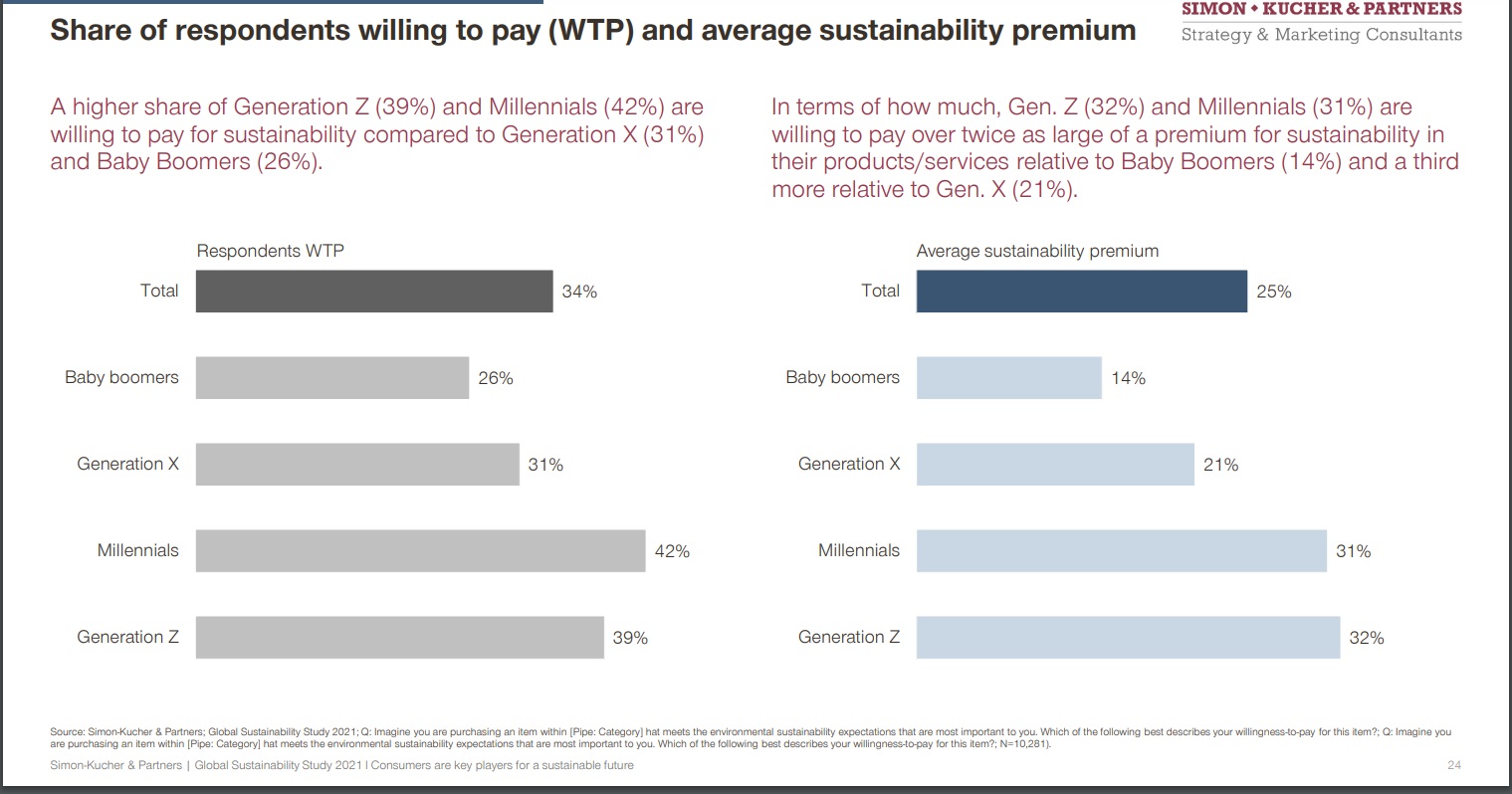
Source-(Simon Kucher)
Embracing Sustainability in the Hospitality Sector
Sustainability does not relate to just the environment, society, or governance. It means the company’s leadership, its connection with the workforce, its take on contributing tax, standing against tobacco, or firearms, being green, following sustainable investments, being ethical, maintaining balanced relations with people, delivering meaningful solutions, running a viable business model. Most importantly, organizations should be able to identify what works for them as sustainable under any given circumstances. For example, if you invest in eco-friendly cleaning products and renewable energy sources like solar panels, you are increasing your hotel's sustainability.
Even before the pandemic, the hospitality industry has been vocal and public in announcing its sustainable goals. For instance, in 2018, Hilton hotels announced cutting its environmental footprint in half and cutting emissions by 61% by 2030.(4) Hotels are now more than just places to sleep and eat. They’re becoming a place to meet, learn, and interact with other people. Sustainable hotels are buildings that use less energy, water, materials, and land to operate more efficiently than regular hotel properties. Integrating green practices into hotels has upfront costs, but these are offset by savings in a short time. Sustainable practices should be embraced by all levels of a hotel's management team--from guest relations to housekeeping.
Hospitality Industry is Adopting Sustainability Measures at Unprecedented Scale:
Growing Popularity of Ecotourism Compels Hotels to Go Green
Ecotourism is gaining popularity with tourists after the pandemic.(5) Creating green spaces for guests to engage in helps them feel more connected to nature, and gives them a sense of belonging in your hotel. Using energy-efficient appliances, purchasing renewable energy credits, or buying weather power sources are some ways of going green. With the increasing need for sustainable developments, green infrastructure is becoming a popular choice for hotels. Whether it is water and energy conservation or waste management, hotels are implementing green infrastructure.
Green Cleaning Products: Eco-friendly, and Provide Marketing Advantage to Hotels
Hotel guests expect to find the cleanest room possible. Traditional hotel cleaners are made with harsh chemicals that may not be good for your health or the environment. By utilizing green cleaning, hotels can avoid the use of harsh chemicals, making a healthier environment for both guests and employees. For example, instead of using traditional aerosols to clean floors, hotels now use a mop and water with plant-based cleaners for a more natural approach.
The purchase of ecological products and the use of green cleaning products can even offer a marketing advantage for hotels by highlighting their commitment to sustainability.(6) In addition to being eco-friendly, green cleaning also saves money by reducing the need for chemical purchasing as well as disposal costs. Green cleaning products help reduce environmental impact, save resources, and maintain air quality standards.
Implementing Recycling Programs to Showcase Environmental Stewardship
Recycling initiatives prove the commitment of hotels to environmental stewardship. In addition, many countries have strict laws about how businesses handle their waste. Having a recycling program in place reduces the chances of facing fines from authorities. Hotels are implementing recycling programs that put your hotel ahead of the curve when it comes to sustainability and resiliency.
Energy-Efficient HVAC (Heating, Ventilation, Air Conditioning) to Save Costs
The challenge for hotels is to keep guests comfortable while managing their costs. This means that room temperature needs to be finely tuned at all times of the day and night. It also means that HVAC systems need to be designed with the latest technology to work seamlessly.
The energy consumption of a hotel accounts for a significant part of its revenue. Therefore, the energy-saving HVAC system in hotels is imperative. Monitoring systems, hot water systems, lighting systems of the building can be optimized using sensors. A recent study(7) reveals hotels can save upto 24% to 58% of energy depending on the sensor type, local climate zone, and version of building energy code.
Germicidal Lighting to Improve Air-quality and Kill Pathogens
Germicidal lights are scientifically proven technology that uses ultraviolet lamps to kill bacteria and viruses. This has a positive effect on the air quality in the hotel. It also eliminates any airborne allergens that might be floating around, making it easier for guests to breathe. Germicidal Lighting is a technology that has been used in hotel spaces to kill bacteria without harming anything else around it. The USFDA asserts that UVC radiation may also be effective in inactivating the SARS-CoV-2 virus that causes COVID-19.(8)
Green Building Certification such as LEED for High-Performance Buildings
The Delft University of Technology study found a direct relationship between green building design and tourist intention of staying.(9) LEED is an internationally recognized green building certification that provides specific guidelines for achieving high-performance, sustainable buildings. LEED certifications are given to commercial, retail, and residential buildings that integrate with the environment by using less energy, water, and materials. There are many benefits to becoming certified. These include increased energy efficiency, reduced waste production, healthier indoor air quality, improved thermal comfort (temperature), better safety (fire suppression), and more natural light (daylighting).
Solar Energy Plant to Meet Energy Requirements
Solar energy plants installed on hotel buildings offer low-cost electricity and reduce air pollution. Solar panels can even generate renewable power for the grid during the daytime. The cost of solar power varies by location and installation type, but it is mostly lower than what utility companies charge for electricity, and therefore, solar panels recoup their initial cost over time. By using photovoltaics and solar energy, Boutiquehotel Stadthalle hotel generates 100% of its energy through green methods.(10)
To step up green initiatives, hospitality establishments should follow the below tips:
- Make sure their property has a green roof
- Use sustainable materials in construction
- Reduce water use by installing low flow fixtures and toilets
- Provide reusable items at the front desk instead of disposable products
- Install insulation in the building envelope - Choose LEED-certified materials when purchasing new furniture or appliances
- Invest in renewable energy sources like solar panels and geothermal heating and cooling systems
- Install more eco-friendly light bulbs
- Provide guests with information about local green activities and events
- Recycle paper products
- Eliminate Plastic Consumption
- Going Paperless
- Managing Water Usage and Reduce Food Wastage
Embracing Resiliency in the Hospitality Sector
#Resiliency is about preparing for and adapting to changes. It's about becoming proactive instead of reactive. Resiliency powers businesses to recover quickly from difficulties. It is the ability of a system to withstand and bounce back from stress or adversity.
Creating Safer Environments for Guests
As customers are demanding reassurances for sanitary conditions amidst heightened concerns for hygiene standards, it is imperative for hospitality players to meet those expectations. For instance, Accor, a hotel chain that operates 5139 hotels across 10 countries, has partnered with Bureau Veritas to create 'ALLSAFE' certification for stringent hygiene standards in their hotel chains. Doctors and epidemiologists were consulted to create the operating guidelines for ALLSAFE labeled hotels.(11)
Focusing on Local Tourism
With continued waves of pandemics, many tourists avoid going to distant destinations and visiting local places. Focussing on the local tourists and catering to their needs can help the hospitality sector nurture a new customer base.
Creating Local Supply Chain
Hotels, restaurants, tourism players, etc., can create supply chain resiliency by turning to local supply chains for raw materials, auxiliary products, and other essentials. A research paper published in the Journal of Tourism and Geosites states that companies supplying local products faced no major challenges as compared to those supplying imported products.(12) It means that hospitality players relying on local products were more resilient than those dependent on global ones.
Hiring Experts and Strengthening Workforce
Hiring a diversified workforce with different expertise is a key to implementing resilience and sustainability. Experts in environment studies, stewardship, finance, green administration, resource management, etc., can be brought together to achieve the goals.
Using Technologies that Boost Resiliency in the Hospitality Sector
Hospitality firms are redesigning their processes with technology implementation in various areas of day-to-day operations. From contactless check-ins to in-room technologies, the hospitality industry has been quick to adopt technologies that resist COVID-19 spread and help firms implement stringent safety protocols for their guests.
Hotels are deploying automation tools for booking management, scheduling tools, guest management tools, payment tools, customer relationship management tools, hotel management software, and many more applications for cost-cutting, targeting new customer segments, enhancing flexibility, streamlining workflows, strengthening communication, and boosting safety standards.
Changing Customer Priorities and Demand in the Hospitality World
What Does the Consumer Want?
Customers are interested in how hospitality businesses are managing their requirements while ensuring hygiene and safety within their establishments. From online bookings, virtual concierge services, and digital check-ins to the highest safety standards and well-being facilities, hotels have to serve a long list of new demands from customers.
"Even before the pandemic, we noticed a shift in consumer behavior leaning more toward an on-demand experience, so we had contactless and virtual services, and the software to power them in place, at all hotels and locations under Jurny management. Our guests had access to the tools for a completely contactless stay, including remote check-in/out, keyless entry, 24/7 virtual concierge services, wifi access, on-demand cleaning, and thermostat control — all through a smartphone”, says Angel Redondo Tena, Vice President of Real Estate and Business Development at Jurny, a hospitality tech company.
We have collated a list of the most-demanded service options from customers based on views of hospitality industry stalwarts and experts.
Adherence to Safety and Health Standards
There is clear customer demand for following the highest levels of sanitation, hygiene, and social distancing standards in hotels and accommodation services. The transition from mediocre cleaning standards to clinically clean hotels is unprecedented. From small-sized hotels, resorts, mid-sized hotels to hotel chains and five-star hotels, all need to adhere to health safety protocols for maintaining customer confidence. Customers also expect free masks and sanitizers.
The hospitality industry needs to provide a safe and healthy work environment for all of its employees. Cleanliness is key in this industry, and it cannot be compromised. Maintaining a clean environment helps prevent diseases from spreading and protects those who are working within the facility. Hotels such as Marriott introduced new standards and enhanced cleaning technologies in 2020, including electrostatic sprayers with hospital-grade disinfectants to sanitize public spaces throughout their hotels.(13)
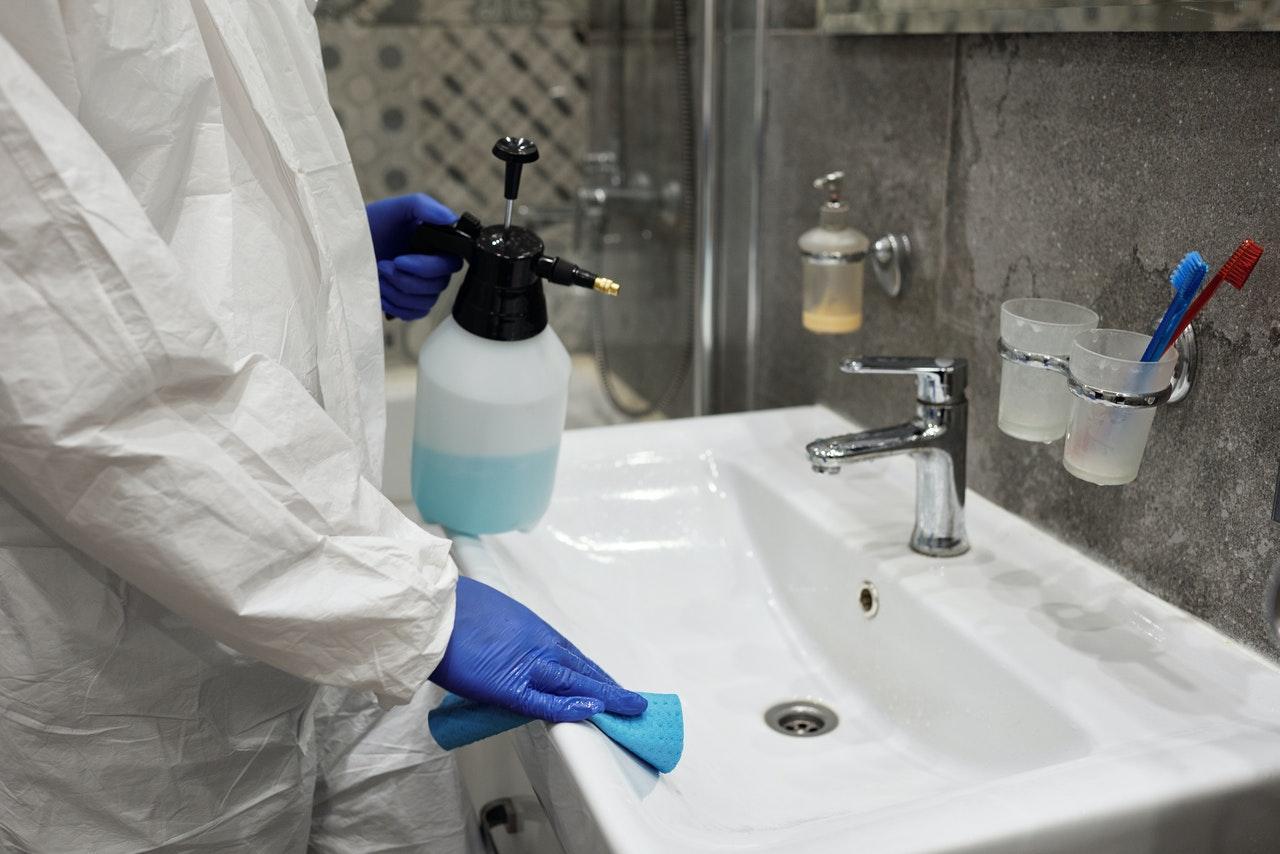
Flexible stays: Cancellation Policy
A last-minute change in plans, illness, or an unplanned event, a better deal elsewhere, There are many reasons why travelers decide to cancel their reservations with hotels. When guests book a hotel room, they expect to be able to cancel their reservation without penalty up until the day of arrival. Hotels now offer guests flexible stays in different room types and configurations across their portfolios.(14) This way, hotels can be more responsive to the guests' needs and provide them with the experience they want.
Digital Room Keys
A hotel with a secure smart lock can be accessed simply by unlocking it with a device instead of a key card or physical key. Many hotels and resorts are now offering digital room keys to their guests. Replacing hotel room keys with NFC-enabled mobile phones to check in and out of hotels is now a reality.(15) These convenient cards can be used in lieu of a physical key for checking in and out of the hotel. They also offer benefits that physical keys don't have, such as not having to carry them around with you, being able to lock or unlock your room from the app without paying an additional fee, and being able to share your secure digital key with friends or family who are staying in the same hotel.
Virtual Concierge
A concierge is a person who provides personal services, such as assistance in planning and arranging travel, entertainment, local amenities, and obtaining tickets. Concierges traditionally work in hotels, providing hospitality to guests. Virtual concierge is a relatively new development in the hotel industry. It is a method of delivering personalized, high-touch service to guests without the use of a physical concierge. They also offer personalized attention and greater efficiency as all data is stored online. Large hotel chains and even smaller management companies have activated a virtual concierge.(16) Virtual concierges offer a variety of other services, including reserving restaurants, ordering room service, booking tours, and spa treatments, researching sights and attractions, etc.
Staycation Option
There is an increase in the number of people who want to disconnect from their busy lives and work, take a digital detox vacation, and break from the technology-filled world with a less expensive and more accessible option. As the cost of travel continues to surge and uncertainty over restrictions continues to jeopardize long-distance travel, many people are deciding to stay local for their vacations.(17) People prefer staycation and enjoy their own surroundings for a digital detox retreat. Hotels have been adapting to this change in consumer preference and have started providing amenities that cater specifically to these needs.
From the rise of Airbnb to the increase in boutique hotels, the hotel market is as competitive as ever. To keep up with this demand, many hotels make use of staycation deals and promotions to attract customers.
Our marketing teams have also been focused on generating demand, enticing guests with many creative offerings such as “staycation” packages and encouraging guests to take their remote work to our hotels using Day Pass, Stay Pass and Play Pass packages, which offer perks such as early check-in, late check-out, supervised children’s activities and more. -Annual Report, Marriott Hotels (18)
From in-room karaoke machines and in-room gaming consoles to luxury spa treatments and rooftop swimming pools, hotels are getting innovative and creative when it comes to catering to the needs of the staycationing customer.
Well-being facilities such as Spa, Meditation, Gym, Therapies
Hotels offer wellness facilities such as spas, cosmetic treatments, massage, nutrition menus, hydrotherapy, meditation, and gym(19) to help guests rejuvenate and alleviate anxiety, stress, and depression. The rise in popularity of wellness-based travel has led to a surge in hotel companies investing in this type of experience. Visitors can find wellness resorts, spas, and retreats all over the world that offer services such as yoga, meditation, and fitness classes.

Virtual Identity Verification
A virtual identity verification system allows customers to share their biometrics and other information through a smartphone app. Digital identification is convenient for guests because it allows them to bypass long lines and delays at check-in desks and hotel security checkpoints. The process also reduces the chances of human error that may arise when scanning physical documents.
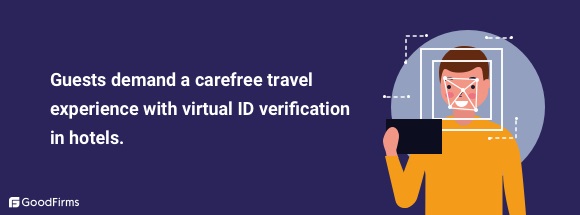
This way, guests can complete their online check-in at the hotel before they even arrive. The process is quick and easy and updates in real-time to include other requests such as room selection, meal preferences, and special requirements.
Other:
- Facility to book services online
- Online food ordering while inside the hotel room
- Free Wifi connectivity
- Free COVID tests if required
Delivering Tangible and Intangible Benefits to the Hospitality Sector through Resiliency and Sustainability
When you take a sustainable and resilient approach to your hotel, you can improve your bottom line, attract higher-paying guests, and increase employee retention. The hospitality industry can embrace these two concepts and have them pay off in the long run. Sustainability is about preserving what we have, while resilience is about being prepared for changing trends.
The benefits of nurturing sustainability and resilience for the hospitality sector are:
- Long-Term Cost Savings
- Improved Guest Safety
- Enhanced Guest Experience
- Increased Brand Value
- Faster Business Recovery and Growth
- Reduces Waste
- Environment-Friendly
- Improves Financing Opportunities
Challenges in Adopting Sustainable/Resilient Practices:
In the VUCA world, a world marked by extreme volatility, uncertainty, complexity, and ambiguity, the hospitality industry needs to constantly innovate to operate sustainably. However, staying relevant and adopting sustainable practices come with their own set of challenges. While staying on the path of resilience and sustainability, the hospitality industry has faced the impact of VUCA in events such as Brexit, trade wars, data breaches, and the pandemic. The hospitality industry is still exposed to VUCA symptoms and has to deal with a number of challenges.
Economic Challenges
Not all businesses within an industry have equal fiscal resources, and therefore, the capacity to absorb a systemic shock or transition to a new regime differs from business to business. A certain amount of assets, fiscal resources, influence, and established variables are critical to navigating any business crisis. Most businesses that ceased trading during the crisis had fewer resources and no financing options. Eco-friendly Amenities cost more and when hotels are struggling with revenue generation amidst the pandemic, adopting sustainability gets impractical. Winston Chu, the CEO of Wayfarer Group, says, "When revenue per room is 25-35% of what it normally is, introducing eco-friendly amenities that are often the higher cost is very damaging because it’s a variable cost.”
Supply Chain Challenges
Sustainable practices demand hospitality businesses to procure locally. If not sourced locally, the money will circulate outside the local community and cause 'leakage.' Leakage, a popular economic concept, deprives locals of participating and benefiting from the supply chain. However, the inclusion of locals in the supply chain comes at a high risk to hospitality businesses. First, it creates a dependency on the local regulations and supply capacities. Secondly, local sourcing may be costly and reduce the price competitiveness of hospitality businesses.
Winston explains- “Sustainability means sourcing locally in many cases, but depending on where you operate there’s often simply not enough supply - even during COVID we’ve served over 15,000 travelers in 2021 and we constantly had to switch vendors as they ran out. Sourcing locally of course, also costs more - China-sourced goods remain the best value for money.”
Government Policies
The hospitality industry is susceptible to unfavorable government policies. For example, during the ups and downs of the pandemic, there was no clarity from the competent government authorities regarding the timescale for the potential reopening of the hotels and restaurants. Many businesses missed the peak season.
Labor Shortage
Seasonal hotels that hire gig workers are still facing severe labor shortages.
Key Findings:
- Sustainability is a key differentiator for buying decisions in the hospitality industry.
- Pandemic has accelerated the sustainability and resilience efforts of the hospitality industry.
- Top pandemic-led roadblocks for the hospitality industry were the shortage of laborers, delayed projects, zero occupancies, trip cancellations, and supply issues.
- The hospitality industry is adopting sustainability measures at an unprecedented scale.
- Hospitality firms are witnessing a fast-paced adoption of green practices, solar energy, green cleaning products, green buildings, germicidal Lighting, and recycling measures.
- Creating a safer environment for guests is the top priority of resilient hospitality firms.
- Hospitality firms can become more resilient by focusing on local tourism and local supply chains, deploying technology, and hiring experts in environmental stewardship.
- Post-peak pandemic consumers demand the highest levels of safety and health measures from hotels, tourism companies, and accommodation services.
- Virtual identity verification, virtual concierge, flexible stays, staycation, well-being facilities, and in-room technologies are top demanded services from hospitality consumers.
- Financial constraints, supply chain issues, frequently changing government regulations, and a labor shortage are top challenges that slow-down sustainability adoption in the hospitality sector.
- Sustainability and resilience are the top growth factors in the hospitality industry.
Conclusion
The way businesses have approached sustainability has evolved over the past decade. A decade ago, sustainability was seen as a fad, but now it has become an integral part of the hospitality industry.
Businesses in the hospitality industry are evolving in order to meet the high expectations of millennials. Hotels are expanding their green initiatives in order to compete with other hotels that are considering sustainability as a strategic goal. While many hotels still have a long way to go when it comes to sustainable practices, there are some hotels that are leading the charge. Prominent hospitality brands are implementing corporate policies that foster sustainability practices.
Hospitality businesses need to rethink and reset their businesses with responsible approaches and reorient and restructure their processes for more accountable economic, social and ecological limits. Contemplation and incorporation of sustainable practices will not only help businesses rebound from the lows but also create new opportunities for the future.
Reference
- https://www.e-unwto.org/doi/pdf/10.18111/9789284421633
- https://s2.q4cdn.com/278413729/files/doc_financials/2020/q4/6b0aaf49-6404-48a5-86fe-565455f79d90-(1).pdf
- https://greenprint.eco/sustainabilityindex/
- https://www.businesswire.com/news/home/20180522006472/en/Hilton-Commits-to-Cutting-Environmental-Footprint-in-Half-and-Doubling-Social-Impact-Investment
- https://www.imf.org/en/News/Articles/2021/02/24/na022521-how-to-save-travel-and-tourism-in-a-post-pandemic-world
- https://www.mdpi.com/2071-1050/13/6/3164
- https://www.tandfonline.com/doi/abs/10.1080/19401493.2021.1994650
- https://www.fda.gov/medical-devices/coronavirus-covid-19-and-medical-devices/uv-lights-and-lamps-ultraviolet-c-radiation-disinfection-and-coronavirus
- https://9lib.org/document/dzxw47nq-tourists-perceptions-green-building-design-intention-staying-green.html
- http://www.greentourism.eu/en/CaseStudy/Details/8
- https://group.accor.com/-/media/Corporate/Investors/Documents-de-reference/2020_Integrated_report_def.pdf
- http://gtg.webhost.uoradea.ro/PDF/GTG-2-2021/gtg.35226-673.pdf
- https://marriott.gcs-web.com/static-files/c5e1faef-f1e5-40e3-bd70-5efbbb929a7f
- https://www.sciencedirect.com/science/article/pii/S0278431921000712
- https://www.assaabloyopeningsolutions.co.uk/Global/Products/Products-old/ASSA-ABLOY-Mobile-Keys/Report-ASSA-ABLOY-Mobile-Keys-Pilot-Clarion.pdf
- https://vtechworks.lib.vt.edu/handle/10919/102152
- https://www.forbes.com/sites/christopherelliott/2020/09/04/the-surprising-reason-staycations-are-the-new-vacations/
- https://marriott.gcs-web.com/static-files/c5e1faef-f1e5-40e3-bd70-5efbbb929a7f
- https://link.springer.com/chapter/10.1007/978-3-030-59820-4_9
